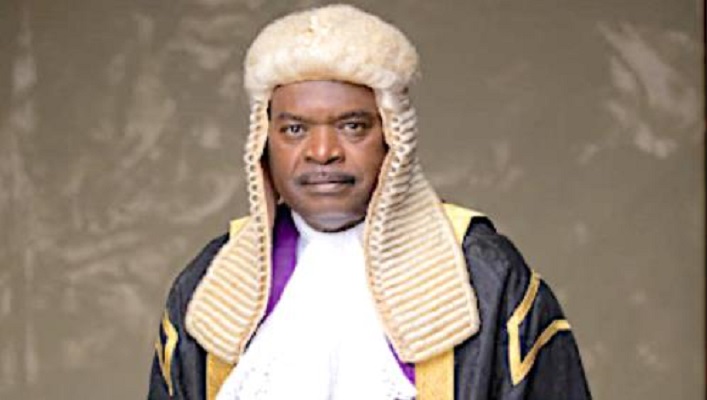Buhari’s nominee to ICC Ishaq Bello lacks competence: Selection Committee

A team of legal experts at the International Criminal Court has rubbished the nomination Ishaq Bello as President Muhammadu Buhari’s candidate for the world crimes tribunal, Peoples Gazette has learnt.
Mr. Bello is the head of the High Court of Federal Capital in Abuja. He was nominated by Mr. Buhari in June as the Nigerian candidate to the Netherlands-based ICC.
But a panel that looked into the competence of candidates to serve on the court rated him at the bottom of 20 judges being considered for the role, according to a report of the panel obtained by the Gazette.
Formally qualified
The committee had in September outlined its criteria to determine the suitability of 20 nominees, out of which six judges will be elected at the Nineteenth Session of the Assembly in December.
The advisory panel listed the parameters for becoming a judge of the ICC as follows:
• Highly qualified: the candidate excels in terms of the experience and knowledge about the Court and its jurisprudence; it is very likely that he/she would be able to make an important contribution to the work of the Court.
• Qualified: the candidate has some relevant experience and knowledge about the Court; he/she could contribute to the work of the Court.
• Only formally qualified: the candidate meets the requirements set out in the Rome Statute for election as a judge, but it is uncertain if the candidate could make a noteworthy contribution to the work of the Court.
• Not qualified: the candidate does not meet the formal requirements set out in the Rome Statute.
In its assessment of the nominees, the committee described Nigeria’s candidate Mr. Bello as having “a very limited knowledge” of the workings of the ICC, hence is only formally qualified for appointment as judge of the Court.
“The Committee noted that, based on his answers to questions particularly regarding participation by victims and the functions of the Pre-Trial Chamber (but also other areas), the candidate appeared notably to have a very limited knowledge of the Rome Statute, the practices and procedures of the Court and its jurisprudence”, the committee’s report seen by the Gazette read.
“Based on both his professional experience as well as his answers during the interview, and bearing in mind particularly his lack of detailed knowledge of the workings of the Court, the Committee concluded that the candidate was only formally qualified for appointment as judge of the International Criminal Court.”
The report, however, highlighted Bello’s extensive judicial experience in criminal proceedings, as well as his articulate and knowledgeable stance regarding criminal law and procedure at the national level.

Sierra Leone shines
Meanwhile, a candidate from Sierra Leone, Maria Matta Samba, was described as “highly qualified” for appointment as judge of the ICC by the advisory panel.
Ms. Samba was deemed to have extensive and wide-ranging national judicial experience, “while demonstrating throughout the interview, her in-depth knowledge of the Rome Statute system and the jurisprudence of the International Criminal Court.”
A haunted jurist
Mr. Bello has been at the high court in Abuja for more than two decades, but it was his 2017 controversial ruling in the 2005 extra-judicial murder of auto spare parts trader that shut him into national infamy.
The FCT chief judge had sentenced two of the six accused police officers accused in the murder to death, while three others, including police chief Danjuma Ibrahim, who reportedly ordered officers to open fire on the unarmed citizens, were controversially discharged and acquited.
The citizens, Ekene Mgbe, Ifeanyin Ozor, Chinedu Meniru, Paulinus Ogbonna, Anthony Nwokike and Augustina Arebu were killed on June 8, 2005. They were understood to be returning from a night club when they were stopped at a police checkpoint.
After killing them, the police officers tagged them as members of an armed robbery gang who had purportedly “opened fire on the officers” when stopped. The police also planted weapons on the victims to cast them in public as armed rogues. No one believed their claim.
A judicial panel of inquiry set up by former President Olusegun Obasanjo rubbished the claim and recommended the trial of the six officers.
After twelve years, Mr. Bello finally ruled on the case. He convicted Ezekiel Acheneje and Emmanuel Baba, both of police rank-and-file.
However, the controversial judge acquitted Mr. Ibrahim and two other officers for want of evidence, ignoring confessional statements of the convicted officers that they shot the traders based on superior directive from Mr. Ibrahim.
Mr. Danjuma’s acquittal was widely condemned by Nigerians. But he was nonetheless promoted as an assistant inspector-general of police following the court case.
Despite concerted plea from the victims’ families, who have lived in agony since the 2005 tragedy, Mr. Buhari’s attorney-general Abubakar Malami also declined to appeal the ruling, leaving Mr. Ibrahim to walk.
Mr. Bello also drew criticism last year when he said families of serving judges could replace them on the bench, a decision critics said effectively elevated nepotism into a state policy.
In March 2018, Nigeria received worldwide accolades when Chile Eboe-Osuji became the president of the ICC. Mr. Eboe-Osuji became a judge at the court in 2012.
We have recently deactivated our website's comment provider in favour of other channels of distribution and commentary. We encourage you to join the conversation on our stories via our Facebook, Twitter and other social media pages.
More from Peoples Gazette

Politics
Katsina youths pledge to deliver over 2 million votes to Atiku
“Katsina State is Atiku’s political base because it is his second home.”

Africa
Govt threatens to stop salaries of striking Kenyan doctors after failed negotiations
The strike has paralysed medical activities in the East African country.

Economy
Naira loses 0.64% against dollar at official market
At the Investor’s and Exporter’s window on Tuesday, the naira traded between N1, 367 and N1, 098 against the dollar.

Africa
Gabon’s national dialogue proposes economic development, good governance
Mr Mve stated that youth unemployment was one-factor government officials believed to be linked to mounting insecurity.

Lagos
Nigeria’s ruling APC used political thugs to suppress Igbo votes in Lagos, rig Sanwo-Olu back to office: U.S. Govt
“Viral videos on social media showed APC supporters in Ojo threatening to attack ethnic Igbo voters presumed to be pro-Obi.’’

NationWide
Public procurement association tasks members on ethical values, best practices
“We are trained to identify those risks and mitigate them.’’

Sport
Mbappe leads PSG’s 4-1 victory over relegation-haunted Lorient
Lorient keeper Yvon Mvogo had to get down well to palm away Mbappe’s curling 17th-minute effort.








